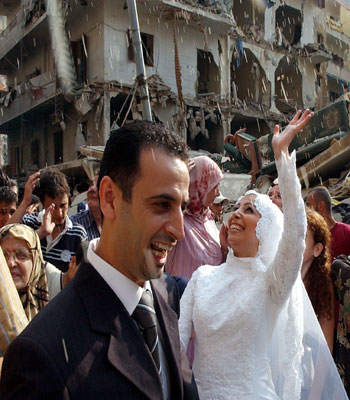
a Lebanese couple celebrates their wedding day in the southern suburbs of Beirut, near their destroyed building (EPA)
BEIRUT (AFP) -An uneasy truce to end 34 days of war in Lebanon faced its biggest test after an Israeli commando raid against Hezbollah which UN chief Kofi Annan said was a violation of the ceasefire deal.
Israel insisted it would not hesitate to carry out more raids to prevent alleged cross-border arms smuggling to Hezbollah and Syria, but Lebanon warned it could stop its troop deployment in the south of the country.
In the first serious violence since the UN-brokered ceasefire came into last Monday, Israel on Saturday airlifted troops into a Hezbollah stronghold in the Baalbek region of eastern Lebanon and clashed with Shiite Muslim fighters.
Annan voiced his concern at the raid, which has underscored the fragility of the truce accord as the United Nations struggles to put together a beefed-up peacekeeping force in war-battered south Lebanon.
“The Secretary-General is deeply concerned about a violation by the Israeli side of the cessation of hostilities as laid out in Security Council resolution 1701,” a statement issued by Annan’s spokesman said Sunday.
“The Secretary-General further calls on all parties to respect strictly the arms embargo, exercise maximum restraint, avoid provocative actions and display responsibility in implementing resolution 1701.”
A visiting UN envoy in Lebanon warned that such incidents threatened to spark war again and scare off states which may help boost the UN peacekeeping force.
“We may slip into war again, this is why incidents such as what happened yesterday are not very helpful,” Terje Roed-Larsen was quoted as saying in Lebanon’s leading Arabic-language An-Nahar newspaper.
“The incident does not help maintain the fragile ceasefire and will not encourage potential participants in the new international force to contribute with soldiers.”
Resolution 1701 calls for Israeli troops to withdraw from south Lebanon in tandem with the deployment of the Lebanese army and a strengthened UN force of 15,000 troops.
The United Nations has been urging countries, particularly European nations, to send troops, but most governments want more details on the precise mandate of the force before contributing.
Israel said Saturday’s raid was aimed at halting weapons smuggling and accused Lebanon of violating the truce by failing to station troops on the border with Syria.
“As long as the Lebanese army and the international forces are not deployed, the Israeli army will not stop its flights in the region to stop the transfers of arms from Syria,” Environmental Minister Gideon Ezra, who is considered close to Prime Minister Ehud Olmert, told public radio.
Lebanese Prime Minister Fuad Siniora blasted Saturday’s operation as a “blatant violation” of the truce, which took effect on Monday to end a conflict that has claimed close to 1,300 lives in Lebanon and killed 160 Israelis.
Lebanon warned it might suspend its troop deployment to Hezbollah’s stronghold in the south, which began on Thursday, if the United Nations failed to ensure Israel honoured the resolution.
“I could ask the cabinet to stop the army’s deployment to the south, as we did not send the troops to fall into an Israeli trap,” Defence Minister Elias Murr said.
A Lebanese military official said Israeli commandos were dropped in by helicopters in the mountainous region of Afqa, about 30 kilometers (18 miles) east of Baalbek, in the central Bekaa valley, at dawn Saturday.
Commandos then drove eastwards to the nearby village of Buday where they clashed with Hezbollah guerrillas, he said.
Israeli public radio said the mission might have been to free the two Israeli soldiers seized by Hezbollah on July 12, or at least to obtain information about them.
Their capture triggered Israel’s massive offensive against Lebanon, the deadliest cross-border fighting in a quarter century.
The Lebanese government announced Sunday cash donations to the victims of Israel’s devastating offensive and their families of between 6,650 dollars and 13,350 dollars each.
Six civilians have killed since the truce took effect. There were also exchanges of fire last week that left at least four Hezbollah fighters dead, but both sides downplayed the clashes.
The Israeli raid came hours before French troops began deploying in Lebanon and as EU leaders hesitated to offer firm troop commitments in the absence of details on the precise mandate of the force.
France is contributing 200 troops, far short of the major commanding role many had foreseen for Lebanon’s former colonial power, and an Israeli foreign ministry official said there was “astonishment” at the low numbers.
About 50 French soldiers from an engineering unit arrived Saturday and another 150 left France on Sunday.
“It’s very important that Europe now steps forward,” Deputy UN Secretary General Mark Malloch Brown said Friday, emphasizing that 3,500 troops were needed on the ground within 10 days.
He said that while Indonesia, Malaysia, Bangladesh and Nepal had all offered troops, there was a need to deploy a balanced European-Muslim force that would be acceptable to both Lebanon and Israel.
Israel has made clear it would not accept countries with which it has no diplomatic relations — such as Muslim-majority Malaysia and Indonesia.
The scope of the force and its rules of engagement were believed to be the major stumbling blocks for European nations, but Malloch Brown said countries now had full details and “the ball is in their court.”

Hezbollah supporters cry over coffin during mass funeral in Deir Qanoun al-Nahr, south Lebanon (R)

A banner blaming the USA for Israel’s month-long offensive on Lebanon is placed near destroyed buildings in the southern suburbs of Beirut (AFP)
